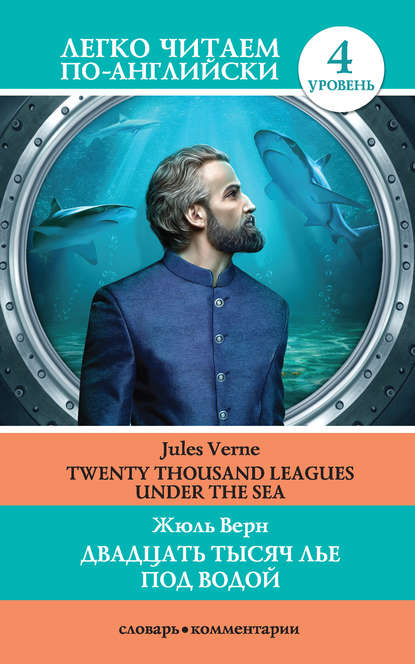По всем вопросам обращайтесь на: info@litportal.ru
(©) 2003-2024.
✖
Двадцать тысяч лье под водой / Twenty Thousand Leagues Under the Sea
Настройки чтения
Размер шрифта
Высота строк
Поля
“All right, Ned, let’s wait and see!” I replied. “It’s clear that these strangers don’t intend to let us die of hunger.”
“Unless they’re fattening us up!” Ned shot back.
“I object,” I replied. “We have not fallen into the hands of cannibals.”
“Who knows?” the Canadian replied in all seriousness. “Maybe these people have gone without fresh meat for a long while, and in that case three healthy, well-built specimens like the professor, his servant, and me—”
“Get rid of those ideas, Mr. Land,” I answered the harpooner.
“Anyhow,” the harpooner said, “I’m hungry!”
“Mr. Land,” I answered, “we have to adapt to the schedule on board, and I imagine our stomachs are running ahead of the chief cook’s dinner bell.”
“Well then, we’ll adjust our stomachs to the chef’s timetable!” Conseil replied serenely.
“Conseil my friend!” the impatient Canadian shot back. “You’re so calm! You’d starve to death rather than complain!”
“Let’s wait,” I said. “Let’s be guided by events, and let’s do nothing, since right now there’s nothing we can do.”
“On the contrary, professor,” the harpooner replied. “There is something we can do.”
“Oh? And what, Mr. Land?”
“Break out of here![24 - Break out of here! – Бежать отсюда!]”
“Breaking out of a prison on shore is difficult enough, but with an underwater prison, it is completely impossible.”
The harpooner said nothing. Under the conditions in which fate had left us, it was absolutely impossible to escape.
“So, Professor Aronnax,” Ned Land went on after thinking for a few moments, “you haven’t figured out what people do when they can’t escape from their prison?”
“No, my friend.”
“Easy. They kick out all the jailers, guards, and wardens,” Ned Land added.
“What’s this, Ned?” I asked. “You’d seriously consider it?”
“Very seriously,” the Canadian replied.
“It’s impossible.”
“And why is that, sir? Some promising opportunity might come up, and I don’t see what could stop us from taking advantage of it!”
Then our conversation finished, and each of us withdrew into his own thoughts. For my part, I had no faith in those promising opportunities that Ned Land mentioned. Besides, before we could do anything, we had to be free, and that we definitely were not.
Ned Land’s hunger was getting him madder and madder. He stood up, pacing in circles like a wild beast in a cage, striking the walls with his foot and fist. Meanwhile the hours passed, our hunger nagged unmercifully, and this time the steward did not appear.
For two more hours Ned Land’s rage increased. The Canadian shouted and pleaded, but the sheet-iron walls were deaf. I didn’t hear a single sound inside this boat. The vessel had undoubtedly sunk into the watery deep and no longer belonged to the outside world.
A noise was audible outside. The locks were turned, the door opened, and the steward appeared.
Before I could make a single movement to prevent him, the Canadian rushed at the poor man, threw him down, held him by the throat.
Conseil was already trying to loosen the harpooner’s hands from his half-suffocated victim, and I had gone to join him, when I heard these words pronounced in French:
“Calm down, Mr. Land! And you, professor, kindly listen to me!”
Chapter 10
It was the ship’s commander who had just spoken. At these words Ned Land stood up quickly. In silence we waited for the outcome of this scene; Conseil seemed almost fascinated, I was stunned.
Arms crossed, leaning against a corner of the table, the commander studied us with great care. Did he regret those words he had just pronounced in French? You would have thought so.
“Gentlemen,” he said in a calm, penetrating voice, “I speak French, English, German, and Latin with equal fluency. Hence I could have answered you as early as our initial interview, but first I wanted to make your acquaintance. Your four versions of the same narrative established your personal identities for me. Now I know you: Professor Pierre Aronnax, specialist in natural history at the Paris Museum and entrusted with a scientific mission abroad, his servant Conseil, and Ned Land, a harpooner of Canadian origin aboard the Abraham Lincoln, a frigate in the national navy of the United States of America.”
I bowed in agreement. The commander hadn’t put a question to me. This man expressed himself with perfect ease and without a trace of an accent. His words were well chosen.
He went on:
“I had great difficulty deciding to talk to you. I am the man who has cut himself off from humanity. Your coming has disrupted my whole existence.”
“Unintentionally,” I said.
“Unintentionally?” the stranger replied, raising his voice a little. “Was it unintentionally that the Abraham Lincoln hunted me on every sea? Was it unintentionally that you traveled aboard that frigate? Was it unintentionally that Mr. Ned Land hit me with his harpoon?”
I detected a controlled irritation in these words.
“Sir,” I said, “you’re surely unaware of the discussions that have taken place in Europe and America with yourself as the subject. You don’t realize that various accidents, caused by collisions with your underwater machine, have aroused public passions on those two continents. We’ve tried to explain this inexplicable phenomenon, whose secret is yours alone. But please understand that the Abraham Lincoln chased you over the Pacific high seas in the belief it was hunting some powerful marine monster.”
A half smile curled the commander’s lips. He said, in a calmer tone:
“Professor Aronnax,” he replied, “do you believe that your frigate wouldn’t have chased and cannonaded an underwater boat as readily as a monster?”
This question baffled me, since Commander Farragut would certainly have shown no such hesitation.
“So you understand, sir,” the stranger went on, “that I have a right to treat you as my enemy.”
I kept quiet.
“Nothing obliged me to grant you hospitality,” the commander went on. “I could sink under the sea, and I could forget you ever existed. Wouldn’t that be my right?”
“Perhaps it would be the right of a savage,” I replied. “But not that of a civilized man.”
“Professor,” the commander replied swiftly, “I’m not what you term a civilized man! I’ve severed all ties with society. Therefore I obey none of its regulations.”
This man had rendered himself independent, out of all reach, free in the strictest sense of the word! No man could call him to account for his actions. These thoughts swiftly crossed my mind.
After a long silence, the commander went on with our conversation.

















